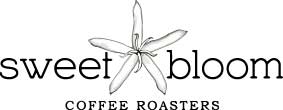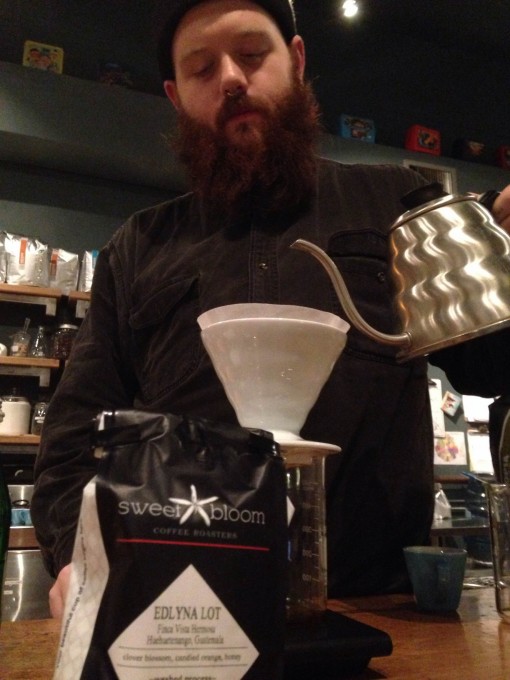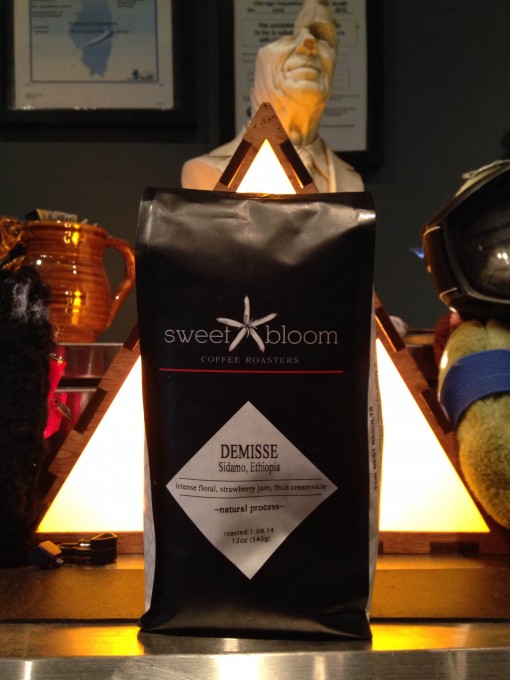Sweet Bloom Coffee, We’re So Down With The Freshness

www.sweetbloomcoffee.com
Our present guest roaster, Sweet Bloom, might prove to be the most refreshing guest roaster we’ve had yet…and easily said, the freshest, as this particular roaster is less than a few months in operation. Furthermore, the coffee showcased on the Wormhole brew bar is Sweet Bloom’s launching selection of coffees! There is, however, no sign of infancy (or immaturity even!) in this company’s ability to produce outstanding coffee. Naturally this is to be expected from a company that is the brainchild of one Andy Sprenger, who has been in specialty coffee for ten years and has held rank in national and international coffee competitions.

As a roaster, Sweet Bloom’s refreshing characteristic can be found in its dedication to familiarizing its consumer with the origin and the producers of the coffee they roast. Single origin coffee and its promotion is nothing new in the specialty coffee world, but Sweet Bloom seems especially interested in connecting the harvesting of a tree’s fruit to the resulting brew served—particularly concerned with connecting beginnings with ends. Consider the name of the roaster itself, a reference to coffee tree blossoms. Where as it might be (and has been in the recent past) beneficial to give coffee an exotic appeal by emphasizing its foreign point of origin—to wit: coffee’s passé nickname java—Sweet Bloom practices the reverse in emphasizing the overall connection and relationship created with the buying and selling of coffee. Such concerns are evidenced by Sprenger’s responses found in the following interview.
………………………………..
WH: Your Facebook page and website present images of coffee at its source and point of origin. Is there anything you are particularly proud of in your green sourcing? Any practice Sweet Bloom commits itself to that you would like to expound upon?
AS: I am definitely proud of our first selection of coffees, not just because they are really good representations of their regions, but because they point towards a model of buying that revolves around relationship with farmers.
Part of our vision for direct trade is to regularly host producers at the roastery – more often than we’ll send representatives from Sweet Bloom to origin. I believe there is greater potential for many to benefit from producers sharing their story with end consumers.
WH: Winning competitions at a national level and placing at a world level, do you think your company, even though it is an emerging one, is required to meet overwhelming expectations? Or is the attention welcome for such a new entity?
AS: Wow, what a great question. The attention in many ways is welcome. But I do feel a weight on my shoulders to live up to people’s expectations – reasonable or not. Hopefully there is a measure of grace given as the dust settles and we continue to adjust to new roasting and brewing equipment.
WH: As well, have you found your own expectations skewed or shifted in the process of building Sweet Bloom?
AS: Certainly my plans shifted significantly during the process of building Sweet Bloom. I had set out to just do wholesale, then found myself leasing a space that was zoned for retail. After agreeing to start off with a pour-over bar, by the time we opened the doors we were offering espresso drinks as well.
WH: Some roasters set out to build a clientele that will eventually align their opinions of coffee with that of the roaster, an “educated” clientele. Others (usually the bigger companies) on the opposite end of the spectrum try to meet a variety of opinions by having a diverse selection of coffee as well as roast profiles. Where would you say your company falls within this spectrum? Where does it aspire to be?
AS: We will sell what we like to drink – hopefully this resonates with a large enough audience.
I love regularly discovering new coffees and returning to tried and true old friends. What this will likely mean for Sweet Bloom is a smaller selection at any given time, but a more diverse selection throughout the year.
WH: What significance does the location of your company have? Does it play a major role in your mind or is it a simple matter of circumstance?
AS: My family and I returned to Colorado to be near my parents, and I opened Sweet Bloom in Lakewood – the town I grew up in, after 23 years of being away. So strategy didn’t play a major role in the choice of location. With that said, the coffee scene in the greater Denver area is thriving and we are happy to supply the increasing demand for outstanding locally roasted coffee.
WH: How did you go about choosing your launching line-up of coffees?
AS: As our name suggests, one of the main qualities we look for is sweetness. I also love coffees that display aromatics of candy (think Pixy Stix) and soft to intense floral characteristics – another nod to our name. Add to that a cup that is clean, balanced, and displays unique flavor characteristics, and our interest is piqued.
This fall we looked at a lot of samples from importers I respect and the coffees we chose were standouts. We are excited and proud to be working with importers that care about fostering sustainable relationships between producers and roasters.

